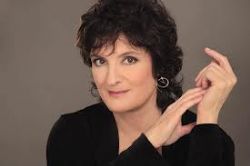|
Symphony
FROM THE NEW WORLD TO THE OLD WORLD
by Peter Lert
Saturday, June 14, 2025
Chamber
MC2 DUO RECITAL CLOSES 222'S SEASON
by Terry McNeill
Saturday, June 14, 2025
Choral and Vocal
CANTIAMO SONOMA'S LUSCIOUS A CAPELLA SINGING IN SEASON ENDING CONCERT
by Pamela Hicks Gailey
Sunday, June 8, 2025
Symphony
SRS SEASON ENDS WITH RESOUNDING TA-TA-TA-BANG
by Terry McNeill
Sunday, June 1, 2025
Symphony
YOUTHFUL VIRTUOSITY ON DISPLAY AT USO'S MAY CONCERTS
by Peter Lert
Saturday, May 17, 2025
Symphony
MYSTICAL PLANETS AND LIVELY GERSHWIN ORTIZ AT FINAL SRS CONCERT
by Peter Lert
Sunday, May 4, 2025
Symphony
VSO'S CONCERT MUSIC OF TIME, MUSIC OF PLACE
by Peter Lert
Sunday, April 27, 2025
VOCAL ELEGANCE AND FIRE AT THE 222'S RECITAL APRIL 26
by Pamela Hicks Gailey
Saturday, April 26, 2025
CANTIAMO SONOMA SINGS AN INSPIRED GOOD FRIDAY MOZART REQUIEM CONCERT
by Pamela Hicks Gailey
Friday, April 18, 2025
DRAMATIC SHOSTAKOVICH SYMPHONY CLOSES PHILHARMONIC'S 25TH SEASON
by Terry McNeill
Sunday, April 13, 2025
|
 |
 Pianist Nina Tichman |
TICHMAN IN COMMAND AT OAKMONT RECITAL
by Terry McNeill
Thursday, March 14, 2013
Attending a Nina Tichman recital is a warmly familiar experience, as the Cologne-based pianist plays nearly everything in the standard literature with a professional command and artistic probity. There is sentiment in her playing but not sentimentality, attention to detail that is never fussy, and interpretations of intriguing music that are sober and thoughtful.
In her fifth recital in the Oakmont Concert Series on March 14, Ms. Tichman programmed a lively first half consisting of unfamiliar Mozart, familiar Brahms and five Chopin Mazurkas. All the pieces had a dance theme, beginning with Mozartís "Fragment of a Suite," K399, and the once-popular "Eine Kleine Gigue," K574. These are curious works, at first sounding like Bach but harmonically not Bach. They are improvisational, and Ms. Tichman played them with clear contrapuntal lines and incisive phrasing.
Five of Chopinís magical Mazurkas came next, in B Major (Op. 41, No. 2), F-Sharp Minor (Op. 6, No. 1), F Minor (Op. Post.), C-Sharp Minor (Op. 50, No. 3) and the A-Flat Major Mazurka of Op. 59, No. 2. These small tone poems were lovingly played by Ms. Tichman, the highlights being the sad lament and captivating ending of the F-Sharp Minor, and the languorous C-Sharp Minor. Her touch and chordal voicing was delicate throughout. The final A-Flat Major Mazurka with its deceptive cadences was faultlessly performed, though the last four (dotted) chords were hurried.
Brahmsí 16 short waltzes, which ended the first half, were composed in the 1860s, in versions for four hands, two pianos and solo piano. Ms. Tichman brought a party approach to this perennially happy music, along with a transparent sound and a bit of Schubert in several of the waltzes.
Following intermission Ms. Tichman delivered a rarely-heard version of Schumannís Symphonic Etudes, Op. 13. The sonic surprise was the inclusion of four of the five seldom-performed studies, interlarded among the standard 12 studies. In remarks to the audience of 150 in Berger Auditorium, Ms. Tichman named Brahms as the arranger of the studies. The additions make the work long; but it is a lovely length, where each mood and figuration varies considerably.
The opening theme was played mezzo forte (though often performed with an eerie pianissimo) and seamlessly moved into the demanding variations. Ms. Tichman chose four of the five posthumous variations, omitting the third and dropping the repeats in the first (Andante) and fourth (Allegretto). She lavished exceptional care on these short gems, overcoming a wide range of pianistic hurdles. Her staccato chord technique and wide skips for the left hand were accurate, and the perpetual motion segments posed no difficulty to her deft and polished technique. She doesnít have a big sound, but itís big enough.
The brilliant and arduous final study, an expansion of the march format in Schumannís Op. 9 "Carnaval," was performed taking the two initial short repeats and with dramatic sforzandos and a driving momentum to a powerful finish.
No encore was offered, and applause was subdued, unexpected given the beauty and authority of the performances. A sixth engagement for this estimable artist at Oakmont would be welcome.
|
